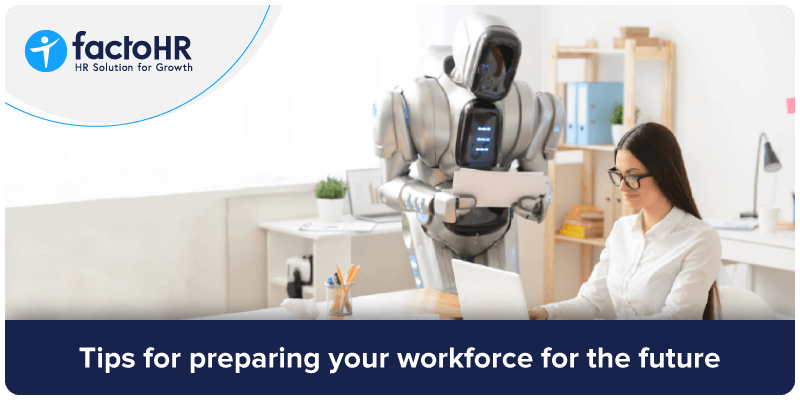Tips For Preparing Your Workforce For The Future

Table of Contents
Success comes from agility, and that’s what is required in today’s fast paced business environment. Organisations need the ability to adapt quickly to stay ahead of the curve. Organisations which are future-ready, prepared for new trends and technologies, have the competitive edge and are set up for success.
What does being future ready mean? It means having the skills and knowledge ready for the changing business environment. It also means having the ability to identify potential risks and opportunities, and capitalising this ability to develop strategies and plans for addressing them.
What does an organisation need to be future ready? Organisations need a diverse and inclusive workforce which is able to adapt to changes quickly, and bring fresh ideas to the table.

How did Covid 19 Change the Workforce
The future of the workforce is a topic that has been under discussion for a few years, but the COVID-19 pandemic has brought this discussion to the centre-stage. The pandemic has permanently changed the way we work or do business.
The COVID-19 pandemic has highlighted the importance of being forward-looking ready for organisations. It has demonstrated the importance of being able to adapt and respond to sudden and unexpected changes. This has included the ability to quickly shift to remote work, adopt new technologies and tools, and pivot business models as needed. The pandemic has also highlighted the value of technology in enabling remote work and maintaining business continuity.
Organisations that were able to rely on technology to enable remote work and collaboration were better able to weather the storm of the pandemic.
Influence of AI and Chatbots on the Future of Workforce
Adaptability is one of the most favoured qualities that will be required by the workforce in future. Recently, OpenAI released ChatGPT, an artificial intelligence (AI) tool that is capable of creating stories and writing code. ChatGPT holds the possibility of superseding certain roles, such as content and copywriting, coding and development, customer service, journalism, and legal document creation. ChatGPT is only the tip of the iceberg of AI developments. As AI continues to advance, more jobs may be automated. However, it will also create new opportunities and industries. Nobel laureate and expert on human judgement Daniel Kahneman has noted that “human reasoning is flawed and that AI is likely to surpass it. The challenge will be for people and organisations to adjust to this shift.” Organisations need to train their workforce on the latest tools to stay ahead of the changes.
Characteristics of the Future Workforce
So what does the future of work look like? What characteristics would be prominently different from the existing patterns? Here’s our take on it.
More Automation and AI
As we move ahead,automation and AI are going to have deeper involvement with the workforce. Experts are observing that robots or other automated systems will be used more regularly to perform tasks. AI-powered tools will help improve efficiency and decision-making.
Remote Work is here to Stay
What started as a need during the COVID-19 pandemic has become a trend that is going to stay for sometime. The world has experienced the benefits of remote work and remote work is going to be a must-have feature of adaptive workforces. Organisations need to have a mix of in-office and remote work, and to facilitate this a greater use of virtual collaboration tools.
Importance of Lifelong Learning
Global economy and business environment is changing at break-neck speed. Hence organisations are emphasising on lifelong learning. Employees should keep updating their skills to remain ahead in the competitive job market.
Diversity and Inclusion at Work
As the global population becomes more diverse, the workforce of the future is more and more likely to be diverse and inclusive. A great paradigm shift is happening in hiring. More focus on hiring and promoting people from all groups is happening globally

Tips for Preparing your Workforce for the Future
In no way these are exhaustive, this is a list of strategies and tips that you may apply to help make your employees future-ready:
1. Continuous Learning as a Mantra
Learning never goes out of fashion. Imbibing the culture of continuous learning within the employees will be one of the top startegies organisations should focus on. The employees who stay current with skills as well as gain new skills in line with industry trends will b able to face any challenges in future. Organisations can support this with various training programs, and professional development opportunities.
2. Embrace Diversity and Inclusion
Actively seek out and recruit diverse candidates and organise diversity training for your employees. Establish your commitment to diversity and inclusion time and again.
3. Cultivate a Culture of Innovation
Organisations should cultivate a culture of innovation by encouraging employees to think creatively and come up with new ideas. Some of the ways to foster innovation in your organisation are to organise hackathons, idea generation sessions, or other challenges which encourage out of box thinking.
4. Purchase the Right Technical Tools
Organisations should be investing in the right technology and tools, to prepare their workforce for the future. These investments will hold the key to helping employees work more efficiently and effectively. Organisations should invest in new software and equipment and also invest in helping employees train to use them.
5. Encourage Work-life Balance
Companies which encourage work-life balance of their employees are the ones which are built for the long haul. Options like working from home or having flexible hours are ways of making it effective. Some companies also offer benefits like on-site daycare or gym memberships to help employees take care of themselves. Using tools that let employees check in remotely can also help in the whole process of encouraging work-life balance.
6. Stimulate Collaboration
Companies which encourage collaboration foster a strong sense of community. Collaboration also leads to better problem-solving and decision-making. Companies can stimulate collaboration with various team building activities.

Conclusion
Future is unpredictable. But, organisations should keep themselves abreast of their industry trends. One of the things organisations should focus on is to enable their workforce to learn new skills and refresh current skills. This can only happen when organisations are committed to the cause of learning and invest in required training systems. That said, it is also important to pursue other facets which impact future-readiness of the workforce. These include culture of innovation, keeping abreast of changing technology, collaboration, work-life balance, diversity and inclusion. These strategies will help businesses to succeed even when the landscape changes quickly.
Grow your business with factoHR today
Focus on the significant decision-making tasks, transfer all your common repetitive HR tasks to factoHR and see the things falling into their place.

© 2025 Copyright factoHR


